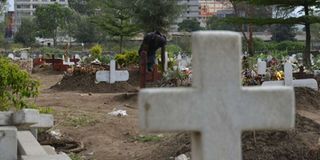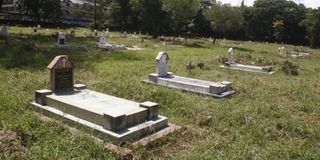Premium
It’s a king’s ransom for a used grave at Nakuru’s chock-full cemeteries

A man says a prayer by the graveside of a relative at the Nakuru North Cemetery in Nakuru county.
What you need to know:
- Nakuru's well-to-do families are struggling to get final resting space for their loved ones.
- Brokers selling used space at Nakuru North Cemetery for as much as Sh100,000.
Partly hidden by a maze of decaying concrete and wooden crosses, a gravedigger gingerly shovels soil out of an old grave. He has to be on the lookout, lest he expose remains buried more than a decade ago.
Welcome to Nakuru County, where it is becoming more expensive to house the living than bury the dead, due to lack of cemetery space.
Nakuru’s main cemeteries – the North and South cemeteries – are full. Naivasha, too, has run out of space to bury its dead. It’s worse in Njoro, where the cemetery was declared full while still under the management of the defunct Nakuru Municipal Council.
With the skyrocketing prices, even Nakuru's well-to-do families are struggling to get final resting space for their loved ones. This, ironically, comes at a time when Nakuru, the de facto political capital of Kenya, is gearing up for city status.
Buying used space
"For you to acquire space for a grave, you must have connections or be ready to part with up to Sh100,000. It is easier nowadays to obtain a house to live in than a grave in Nakuru town," a resident, Mr Joseph Karanja, told the Nation.
At the Nakuru North Cemetery, an ordinary grave should set you back not more than Sh20,000 for an adult and about Sh5,000 for a child.
But brokers are selling used space at the facility at sometimes more than Sh100,000.
Mr James Murage, whose family buried a loved one at the facility recently, revealed to the Nation how complicated and costly it is to secure burial space at the already filled-up cemetery.
"I was tasked by the family to secure space for my grandmother. I had to pass through at least three people and, finally, I parted with about Sh80,000 – and that was only for the space. After factoring in other costs, we ended up spending more than Sh100,000 for the entire exercise," he said.
Another resident, who sought anonymity, recalled how her family parted with Sh50,000 to secure space on top of other graves.

A section of Nakuru North Cemetery in Nakuru county in this photo taken in 2018.
"We paid Sh50,000 to obtain space and when the gravedigger was preparing the final resting place, he almost exposed three other bodies," said the source.
Apparently, one cannot possibly avoid the cartels, as only they know where the spaces are. They, therefore, guide the gravediggers so as to avoid exposing old graves.
At the Nakuru South cemetery, which borders the Nakuru National Park, an ordinarily grave that should cost Sh3,500 for an adult and Sh2,000 for a child now goes for between Sh5,000 and Sh10, 000.
And digging graves on top of others is not the only desperate measure residents are latching onto for space to bury their dead. Some graves are being dug on footpaths and along perimeter fences.
The only burial space left in the county is to be found at the Gilgil cemetery. This, too, may not last long.
County Lands, Housing and Physical Planning Executive Frank Mwangi says the challenge is to get a piece of suitable land. The communities bordering the cemetery must also welcome the plan.
Disposing the dead
“Many communities don’t want a cemetery next to their residential neighbourhoods but, as a county, we are determined to get one and soon we shall,” said Mr Mwangi. "We are on course.”
The crisis has pushed health authorities in the region to think creatively about disposing of the dead. Health chiefs are now encouraging residents to embrace cremation as an alternative.
“Cremation should be embraced as we continue looking for land to put up cemeteries,” said Dr Samuel King’ori, the county Public Health Chief Officer.
There is only one crematorium in Nakuru Town, which belongs to the Hindus, situated next to the Nakuru South cemetery.
In the 2014/15 financial year, Sh84 million was set aside for the purchase of a 20-acre parcel of land for a public cemetery.
Another Sh30 million was allocated in the 2015/16 budget, Sh40 million in 2016/17 and a similar amount in 2017/18. In the 2019/20 financial year, another Sh20 million was set aside to purchase land for a cemetery.
Previous attempts to acquire land in various places, including Rongai and Naivasha, failed as residents said the graveyards would lower the value of their land.





